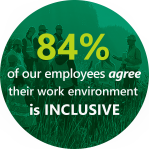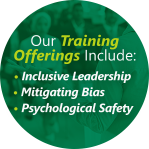 Inclusion
Inclusion
Building a culture where everyone belongs
We believe in the power of building and nurturing a work environment where all employees feel heard and valued, have opportunities to develop and grow, and are empowered to share and implement ideas for making our company better. We know that embracing different experiences and points of view leads to increased innovation, better decision-making and, ultimately, a much stronger company. It is also just the right thing to do — for our people and the communities where we work.
OUR INCLUSION STORY
At Weyerhaeuser, our values are sacred and have been deeply embedded in our culture over many decades, so we don’t change them without careful consideration. In 2019, we added inclusion to our list of core company values because we understand that to help drive innovation and continue to attract and retain employees from an increasingly diverse pool of talent, we need to make it clear that our commitment to building a truly inclusive workplace is unwavering and will not be compromised, just as it is for safety, integrity, citizenship and sustainability.
The decision to make inclusion a core value was just one step forward. We also formed an Inclusion Council that comprises employees from all corners, demographics, and levels of the company. This council convenes regularly to discuss ways we can improve our inclusive culture at Weyerhaeuser and then helps us take action.


OUR COMMITMENT TO ACTION
With input from our Inclusion Council, we identified three inclusion focus areas: leaders, people, and culture. In each category we set annual goals; some are evergreen areas of focus that we work on every year and others are specific improvement activities we identify to drive progress.
To gauge the effectiveness of our work, we conduct employee surveys and review feedback, and then determine which activities we should continue, stop, or modify, and which new activities we should begin to drive continued progress.
Below are some examples of the work we do in each category. To achieve sustainable momentum, we’re committed to ongoing effort, learning, reflection and accountability.
LEADERS
Our goal is to grow leaders at all levels of the company who are skilled at building inclusive teams. Examples of what we do to support this goal:
- Ownership: Our top leadership teams annually identify actions they will take in their own organizations to promote inclusive behaviors on their teams.
- Training: We offer training on topics such as inclusive leadership and psychological safety to our leaders in online, virtual and classroom settings.
- Engagement: We proactively engage in inclusion conversations with leadership teams in our staff groups and operations. We also equip leaders with an online toolkit they can use to engage their own teams about what it means to be inclusive.
- External Input: We periodically benchmark and engage external experts to ensure we are following best practices and focused on high-impact activities.
PEOPLE
We want all our people to feel empowered to develop, grow, share ideas, and innovate, without encountering unfair barriers to their success. Examples of what we do to support this goal:
- Anti-discrimination: We do not tolerate discrimination or harassment of any kind in our workplace. We have anti-discrimination, anti-harassment and equal-employment opportunity policies in place, and we deploy training on these policies to ensure understanding and compliance. We also conduct periodic reviews of these policies to ensure we are making improvements when needed.
- People Decisions: When hiring, promoting and terminating employees, we use consistent processes to ensure all decisions are based on clear competencies and performance criteria. In making these decisions, we do not discriminate based on race, color, ethnicity, national origin, religion, sex, gender, age, disability, veteran status, sexual orientation, genetics, gender identity or expression, or any other characteristics protected under law. We also periodically conduct pay equity reviews.
- Training & Development: All employees have access to our comprehensive online training catalog, and all leaders are equally eligible to participate in our front-line and mid-level leadership development programs. We also offer mentoring opportunities to all employees.
- Recruiting & Hiring: As an equal opportunity employer, we make hiring decisions that are fair, strictly based on qualifications, and free of discrimination of any type. Our job posting policy requires all nonexecutive roles to be posted for a minimum of five days to ensure all qualified internal candidates have an opportunity to apply. For external postings, we partner with DirectEmployers Association to ensure our roles appear on a wide range of job boards. To support objective decision-making in the hiring process, we mask names on resumes and encourage consistency in the interview processes.
- Relief Fund: We partner with a third-party nonprofit to offer an emergency relief fund to our employees that helps those who suffer from financial hardship caused by events such as hurricanes, fires, tornadoes, floods, military deployments and domestic violence. The fund covers the cost of basic human needs for employees who cannot afford access to these necessities in an emergency.
CULTURE
We strive to build a culture where all our people are equipped with the information, tools, training and inspiration they need to create and sustain an inclusive workplace. Examples of what we do to support this goal:
- ERGs: We have eight employee resource groups (led by employees) that focus on building strong networks, promoting awareness and learning, and supporting career development and recruiting efforts. All our ERGs are open and welcoming to all employees who want to participate.
- Inclusion Blog: Our internal inclusion blog, penned by our chief administration officer, focuses on informing, educating, inspiring and connecting the dots for employees on how inclusion matters in everything we do.
- Training: Our voluntary online training catalog is accessible to all employees and includes 100+ different micro-learning options on a wide variety of people skills, leadership development areas, business fundamentals, and inclusion topics.
- Feedback: Every year we conduct a companywide employee feedback survey to assess the health of our workplace culture. We include questions about inclusion and review our results across demographics to identify strengths and gaps.
OUR PROGRESS SO FAR
We are proud of the progress we have made to build an inclusive culture that welcomes people from many different backgrounds, experiences, geographic regions and perspectives. We’ve seen promising improvement in how employees across demographics feel about our inclusive culture based on the survey questions we ask each year, and we’ve seen tremendous and growing engagement with our revitalized employee resource groups across the company, which are open to everyone.
We know sustainable change does not happen overnight, and that it takes dedicated time and resources to drive that change. We have plenty of work ahead of us, and we’re confident we’re on the right path forward.
By using this website, you agree to our Privacy Policy. California residents: See our CCPA Privacy Notice for details on what personal information we collect and for what purposes.
